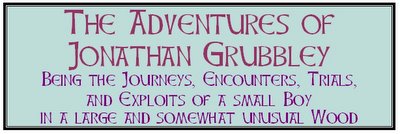Chapter the Fifth
 Auntie Woezzl made room beneath the canary bumbershoot—not out of place on a rainy day but somehow shocking amid the day’s gloom—and Jonathan joined her. Together they proceeded on a winding stroll through Wolmsley Wood. (Was it still a fruit orchard? Jonathan could no longer make up his mind on this point.) At last they came up to the largest tree Jonathan had ever seen. It was broad and tall and dark and covered with gnarly things and moss and was simply ENORMOUS. Auntie Woezzl closed her bumbershoot and used it to tap one of the tree’s many knotty appurtenances, whereupon a door swung open and Jonathan beheld a hallway within the tree, all warm and dry and lighted.
Auntie Woezzl made room beneath the canary bumbershoot—not out of place on a rainy day but somehow shocking amid the day’s gloom—and Jonathan joined her. Together they proceeded on a winding stroll through Wolmsley Wood. (Was it still a fruit orchard? Jonathan could no longer make up his mind on this point.) At last they came up to the largest tree Jonathan had ever seen. It was broad and tall and dark and covered with gnarly things and moss and was simply ENORMOUS. Auntie Woezzl closed her bumbershoot and used it to tap one of the tree’s many knotty appurtenances, whereupon a door swung open and Jonathan beheld a hallway within the tree, all warm and dry and lighted.“Don’t gape, Grubbley, we’re only getting wet out here.”
Jonathan started slightly then entered the hallway. Auntie Woezzl followed and closed the door behind them. Jonathan began to recover from his surprise and proceeded to remove his raincoat and rubbers like a polite guest.
“Much better, dear. Just make yourself at home,” encouraged Auntie Woezzl.
“You have such a snug and friendly tree, I mean, home,” Jonathan responded.
“Why, thank you, Grubbley. It’s been in the family for centuries. And now for tea.”
It only took a few moments for the strange old lady to get tea ready. And, noted Jonathan, she had such delicious biscuits. One would never suspect that one was having tee in a tree, smack in the middle of a rainy wood. But Jonathan could not forget that he was, somehow, in the midst of Wolmsley Wood. He had, evidently, entered at his own peril, just as the sign had warned. He finally decided to ask this unusual woman called Cluggin and Auntie Woezzl and all those other funny names some questions.
“Excuse me, Auntie Woezzl, but I was wondering….”
“As well you might,” she interrupted. “Wolmsley Wood is such a strange place, and I suppose that I am one of its stranger inhabitants. No doubt you have all manner of questions,” she continued as she picked up after tea. “But there really isn’t time to answer them all, you see. There’s so much to do, and I’m sure you’ll want to finish before your mother should begin worrying about you.”
“Do what, Mum?” Jonathan was getting suspicious again.
Auntie Woezzl seemed not to hear him as she looked through the lace curtains at one of the windows in the tree, windows that Jonathan had not seen from outside the tree.
“Ah yes, it’s stopped raining. Excellent! Now then, you’ll need some kind of map,” she muttered, then looked about the room. Her already wrinkly face wrinkled some more as her eyes glanced from the plushy old sofa to the bookshelves, past the floor lamp and the hutch full of dishes and bizarre oddments, and beyond the slightly crooked paintings and plaques on the peeling walls. Perhaps the cozy room was a bit in need of renovation, thought Jonathan, given that it has been in her family for centuries.
“Perhaps in the kitchen,” the old woman added, more to herself than to Jonathan, and bustled out of the room.
She returned in a trice, beaming and proclaiming, “Just the thing!” In her hand she carried a crumpled sheet of paper, evidently retrieved just now from the dustbin. “Be a good sort, Grubbley, and fetch me that goose quill, would you?” she asked, indicating the small secretary in the corner. Jonathan did as he was bidden. As he handed her the dusty quill he opened his mouth to enquire as to the relationship of paper refuse to maps and to the relationship of both to himself. Once again, Auntie Woezzl responded before he had a chance to proceed further.
“Yes, it is rather a dusty thing. Cobwebs too. I really ought to clean house more often, but it never was my strong point. Don’t write much either. I visit friends and never correspond with my enemies. This wrapping sheet is the only paper in the house, I fear, but it will do splendidly. Now do pay attention, Grubbley. This if frightfully important.”









